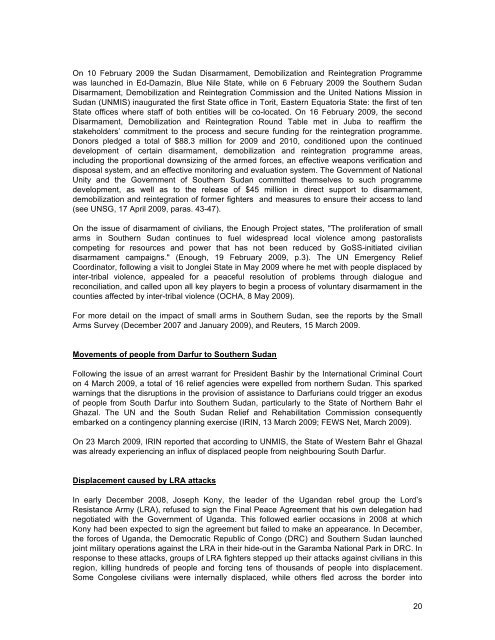SUDAN: Durable solutions elusive as southern IDPs return and ...
SUDAN: Durable solutions elusive as southern IDPs return and ...
SUDAN: Durable solutions elusive as southern IDPs return and ...
You also want an ePaper? Increase the reach of your titles
YUMPU automatically turns print PDFs into web optimized ePapers that Google loves.
On 10 February 2009 the Sudan Disarmament, Demobilization <strong>and</strong> Reintegration Programme<br />
w<strong>as</strong> launched in Ed-Damazin, Blue Nile State, while on 6 February 2009 the Southern Sudan<br />
Disarmament, Demobilization <strong>and</strong> Reintegration Commission <strong>and</strong> the United Nations Mission in<br />
Sudan (UNMIS) inaugurated the first State office in Torit, E<strong>as</strong>tern Equatoria State: the first of ten<br />
State offices where staff of both entities will be co-located. On 16 February 2009, the second<br />
Disarmament, Demobilization <strong>and</strong> Reintegration Round Table met in Juba to reaffirm the<br />
stakeholders’ commitment to the process <strong>and</strong> secure funding for the reintegration programme.<br />
Donors pledged a total of $88.3 million for 2009 <strong>and</strong> 2010, conditioned upon the continued<br />
development of certain disarmament, demobilization <strong>and</strong> reintegration programme are<strong>as</strong>,<br />
including the proportional downsizing of the armed forces, an effective weapons verification <strong>and</strong><br />
disposal system, <strong>and</strong> an effective monitoring <strong>and</strong> evaluation system. The Government of National<br />
Unity <strong>and</strong> the Government of Southern Sudan committed themselves to such programme<br />
development, <strong>as</strong> well <strong>as</strong> to the rele<strong>as</strong>e of $45 million in direct support to disarmament,<br />
demobilization <strong>and</strong> reintegration of former fighters <strong>and</strong> me<strong>as</strong>ures to ensure their access to l<strong>and</strong><br />
(see UNSG, 17 April 2009, par<strong>as</strong>. 43-47).<br />
On the issue of disarmament of civilians, the Enough Project states, "The proliferation of small<br />
arms in Southern Sudan continues to fuel widespread local violence among p<strong>as</strong>toralists<br />
competing for resources <strong>and</strong> power that h<strong>as</strong> not been reduced by GoSS-initiated civilian<br />
disarmament campaigns." (Enough, 19 February 2009, p.3). The UN Emergency Relief<br />
Coordinator, following a visit to Jonglei State in May 2009 where he met with people displaced by<br />
inter-tribal violence, appealed for a peaceful resolution of problems through dialogue <strong>and</strong><br />
reconciliation, <strong>and</strong> called upon all key players to begin a process of voluntary disarmament in the<br />
counties affected by inter-tribal violence (OCHA, 8 May 2009).<br />
For more detail on the impact of small arms in Southern Sudan, see the reports by the Small<br />
Arms Survey (December 2007 <strong>and</strong> January 2009), <strong>and</strong> Reuters, 15 March 2009.<br />
Movements of people from Darfur to Southern Sudan<br />
Following the issue of an arrest warrant for President B<strong>as</strong>hir by the International Criminal Court<br />
on 4 March 2009, a total of 16 relief agencies were expelled from northern Sudan. This sparked<br />
warnings that the disruptions in the provision of <strong>as</strong>sistance to Darfurians could trigger an exodus<br />
of people from South Darfur into Southern Sudan, particularly to the State of Northern Bahr el<br />
Ghazal. The UN <strong>and</strong> the South Sudan Relief <strong>and</strong> Rehabilitation Commission consequently<br />
embarked on a contingency planning exercise (IRIN, 13 March 2009; FEWS Net, March 2009).<br />
On 23 March 2009, IRIN reported that according to UNMIS, the State of Western Bahr el Ghazal<br />
w<strong>as</strong> already experiencing an influx of displaced people from neighbouring South Darfur.<br />
Displacement caused by LRA attacks<br />
In early December 2008, Joseph Kony, the leader of the Ug<strong>and</strong>an rebel group the Lord’s<br />
Resistance Army (LRA), refused to sign the Final Peace Agreement that his own delegation had<br />
negotiated with the Government of Ug<strong>and</strong>a. This followed earlier occ<strong>as</strong>ions in 2008 at which<br />
Kony had been expected to sign the agreement but failed to make an appearance. In December,<br />
the forces of Ug<strong>and</strong>a, the Democratic Republic of Congo (DRC) <strong>and</strong> Southern Sudan launched<br />
joint military operations against the LRA in their hide-out in the Garamba National Park in DRC. In<br />
response to these attacks, groups of LRA fighters stepped up their attacks against civilians in this<br />
region, killing hundreds of people <strong>and</strong> forcing tens of thous<strong>and</strong>s of people into displacement.<br />
Some Congolese civilians were internally displaced, while others fled across the border into<br />
20
















